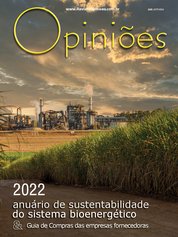Renato Zanetti
Superintendente de Sustentabilidade e Excelência Operacional da Tereos
AsAA22
O setor sucroenergético e a economia de baixo carbono
Responsável por cerca de 27% do PIB brasileiro, o agronegócio é um dos motores da economia brasileira. Segmento essencial, o agro não parou na pandemia e ainda registrou crescimento, ao contrário de outros setores que sofreram com o lockdown. Com esse currículo, não é de se estranhar que o agro esteja no centro de discussões importantes e atuais sobre temas ambientais, sociais e de governança. As pautas sobre ESG (sigla, em inglês, para Environmental, Social and Governance) fazem cada vez mais parte do dia a dia das empresas do agronegócio, e, independentemente do tamanho, o comprometimento socioambiental e a transparência sobre essas práticas crescem exponencialmente.
O debate atual sobre ESG interessa ao setor e pode ser uma oportunidade para o agronegócio mostrar como a produção agrícola tem caminhado junto ao desenvolvimento sustentável. No setor sucroenergético, entendemos que a sustentabilidade é muito mais do que um diferencial competitivo. Está no DNA de tudo que fazemos. Com a missão de produzir alimento e energia limpa a partir da valorização da matéria-prima, já operamos na lógica da economia circular.
Isso significa que é possível fazer o aproveitamento ao máximo da nossa matéria-prima, a cana-de-açúcar, e, sob essa óptica, nada se desperdiça, e tudo se aproveita. Os coprodutos e resíduos do processamento da cana são utilizados na fertilização de solos, na nutrição animal através da secagem de levedura, na cogeração de energia limpa e renovável por meio da biomassa e, mais recentemente, na produção do biogás, que se transforma em fonte de geração de energia verde, e no biometano.
Isso significa que é possível fazer o aproveitamento ao máximo da nossa matéria-prima, a cana-de-açúcar, e, sob essa óptica, nada se desperdiça, e tudo se aproveita. Os coprodutos e resíduos do processamento da cana são utilizados na fertilização de solos, na nutrição animal através da secagem de levedura, na cogeração de energia limpa e renovável por meio da biomassa e, mais recentemente, na produção do biogás, que se transforma em fonte de geração de energia verde, e no biometano.
Outro importante tema do debate atual, que também traz uma oportunidade para que as empresas sucroenergéticas se posicionem, é a descarbonização do planeta a partir da transição para uma economia de baixo carbono. Temos uma série de desafios a percorrer, mas sabemos a relevância que podemos ter nessa história. Ao colocar em evidência o protagonismo do etanol, podemos ajudar o Brasil a estar em uma posição favorável no combate às mudanças climáticas.
Com 90% menos emissão de GEEs (gases de efeito estufa), se comparado à gasolina, o etanol desponta como uma das principais fontes renováveis do mundo. É aqui, no nosso país, que o setor sucroenergético se destaca como o segundo maior produtor global do biocombustível, atrás apenas dos Estados Unidos. E é no Brasil também que podemos dizer que o agronegócio tem condições de contribuir efetivamente para uma economia de baixo carbono. Já vimos, na prática, mudanças acontecerem por conta do etanol. Segundo dados da Unica, cerca de 515 milhões de toneladas de gases de efeito estufa deixaram de ser despejados na atmosfera no período de 2003 a 2020, resultado que se evidencia a partir do lançamento dos veículos flex no Brasil.
Quando falamos em descarbonização, mais recentemente também temos visto a produção de biometano através da biodigestão da vinhaça e da torta de filtro ganharem espaço na discussão. Ambos são resíduos do processamento de cana, ricos em carga orgânica e, atualmente, utilizados como fertilizantes nos campos. Apontado como combustível verde e renovável, o biometano tem potencial real para assumir um papel relevante na descarbonização da matriz energética nacional na substituição do diesel, combustível fóssil, em caminhões e máquinas agrícolas, além de contribuir fortemente para a segurança energética do País.
Todos os exemplos comentados mostram como o agronegócio se compromete, na prática, com princípios ESG e deixam clara a oportunidade que nós temos, como líderes do setor, de alavancar práticas sustentáveis em toda a cadeia produtiva. Entidades civis, empresas privadas e instituições públicas, dentro e fora do Brasil, estão de acordo de que é preciso, de fato, agir. Do lado do setor sucroenergético, seguiremos investindo nos caminhos que contribuam, literalmente, para que o mundo respire um pouco mais aliviado.




